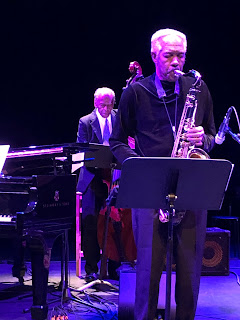The first time I heard the Cookers live, I couldn't see them. It happened at the Detroit Jazz Festival, around 2012. The group was playing on one of the stages that's built into the ground, with concrete seats. The steps to get to the stage were mobbed with people, making it next to impossible to file in. But the sound of the group was flowing upwards and felt so powerful, I was tempted to just stand there, staring at a concrete wall, just so I could soak up the music. That's how tight the group was.
A band with two saxophones, two trumpets and rhythm section might lead one to assume the Cookers are a thrown-together band of veterans, playing hard bop classics they all know. Don't you believe it. The Cookers are a unit. Sure, they might dig into tenor saxophonist Billy Harper's past and pull out a song or two that he played with Lee Morgan in the early '70s, but for the most part this group is living in The Now.
Along with Harper, the Cookers consist of David Weiss (trumpet), Eddie Henderson (trumpet), Donald Harrison, Jr. (alto), George Cables (piano), Cecil McBee (bass) and Billy Hart (drums). All of them are leaders with vast discographies but what they create together sounds especially huge. On the subject of huge, their arrangements last Saturday at Pittsburgh's New Hazlett Theater often made the four horns sound twice as big, due to the way they spread the harmonies between them.
The first set opened with Harper's "The Call of the Wild and Peaceful Heart," the title track of their 2016 album which has several movements before its author started to stretch out on it. He was tonguing a lot of his lines, but managed to throw in some staccato thoughts and low honks. He might have gone for a chorus or two too long, but it was great hearing him again. Weiss followed, with Cables almost stealing the whole spotlight after him. The pianist might be better known as a support player (he appeared on a lot sets with Art Pepper, among others) but his left horn pounded out chords with the type of authority that makes you want to explore more of his own work as a leader.
Things continued with McBee's "Peacemaker." I forgot to note which trumpet player soloed but my guess would be Henderson and my notes indicated how he created suspense with some good valve squirts and stop time. When the group reconvened before Harrison's solo, the horn sound felt especially big. Harrison too used the stop-times of the tune to create more drama.
A few people in the audience were bothered that Weiss didn't mention Billy Hart in his between-song announcements. It wasn't that he was overlooking the drummer; he simply hadn't soloed yet. But people were noticing Hart, especially during tunes like "Croquet Ballet," where he pushed everyone hard. Cables again sounded especially beautiful on this tune that appeared on Lee Morgan's last studio album.
The second set opened with Cables' "The Mystery of Monifa Brown," which again highlighted the sound of the horns and the power of its author's pedal point playing. The break between sets seemed to really energize Harrison, who was really fired up, nearly leaving his fellow saxophonist in the dust.





No comments:
Post a Comment